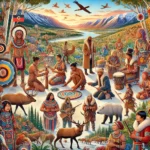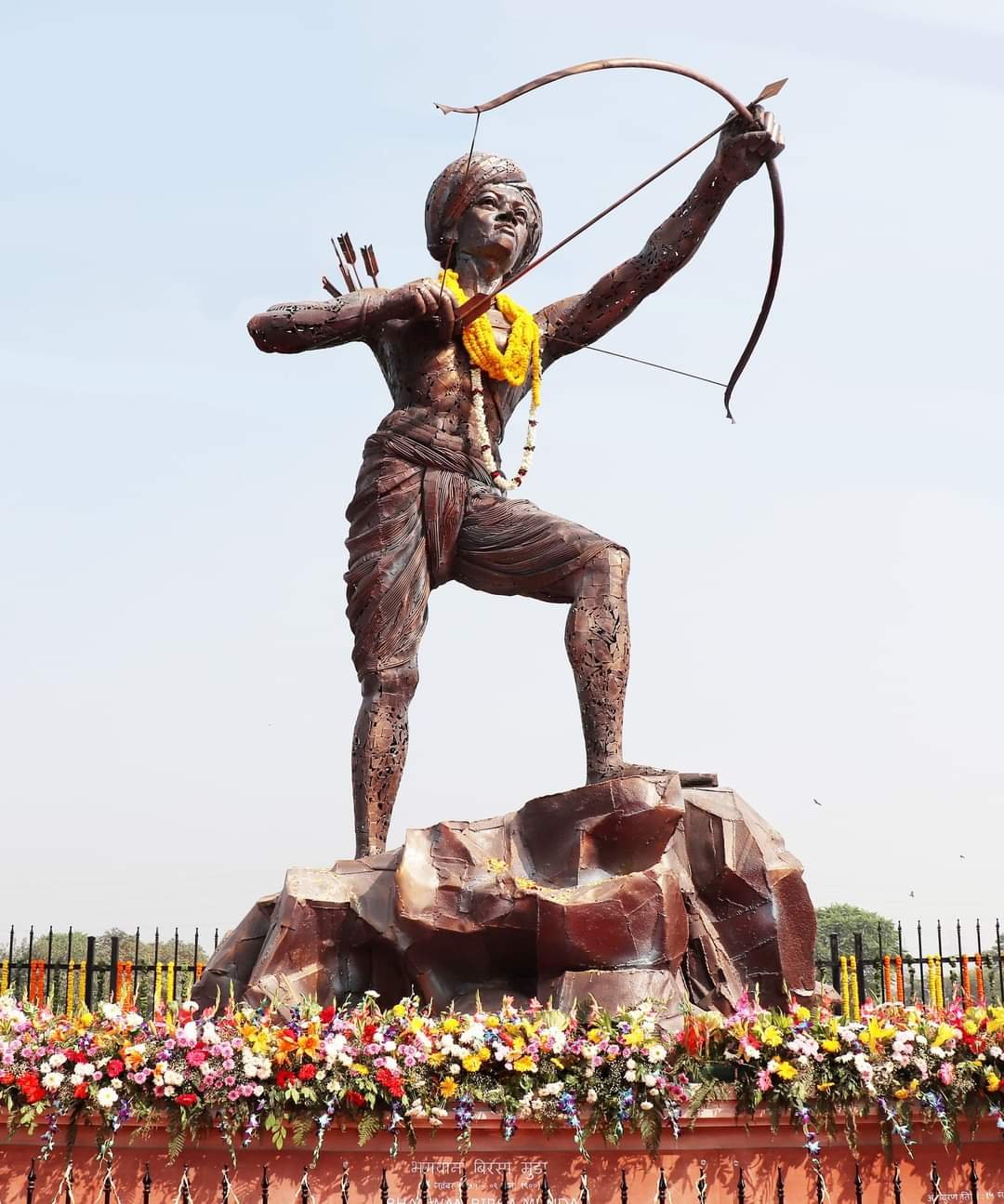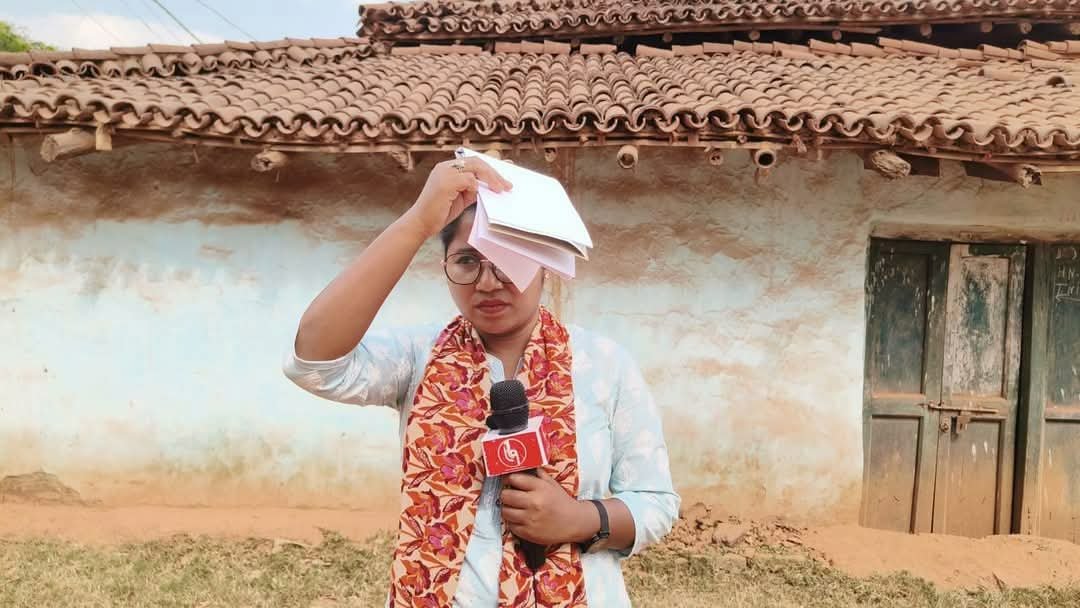Birsa Munda, a great freedom fighter, social reformer, and tribal leader of India, is revered as a deity by the tribal communities of Jharkhand and its neighboring regions. The reverence for him as a “god” stems from his life, struggles, and profound contributions to tribal society. This essay explores the historical and cultural background of Birsa Munda’s life, his ideology, and why he is considered a divine figure.
- Introduction to Birsa Munda and His Childhood
Birsa Munda was born on November 15, 1875, in the village of Ulihatu in present-day Jharkhand. He belonged to the Munda tribe, a farming community deeply affected by exploitation under British rule. From an early age, Birsa witnessed the hardships faced by his people and realized the need for strong leadership to liberate tribal society from exploitation and poverty.
Birsa received early education at a missionary school where he was introduced to Christianity. However, he later reverted to his traditional tribal faith and culture. He also worked to eradicate social evils such as superstitions and harmful traditional practices from his community.
- The Exploitation of Tribal Society and Birsa’s Struggles
During the 19th century, tribal communities faced immense exploitation, particularly through the “zamindari system” introduced by the British. This system displaced tribal communities from their ancestral lands, forcing them to work as laborers on their own fields. Additionally, Christian missionaries exerted cultural and religious pressure on the tribal populace, threatening their traditional identity.
Birsa Munda rose against these injustices. He led the “Ulgulan” or “Great Rebellion” against British rule and their allied landlords. The movement aimed not just to reclaim tribal lands but also to preserve tribal culture, religion, and independence.
- Social and Religious Contributions of Birsa Munda
Birsa Munda emerged as both a religious leader and a social reformer. He presented himself as “Dharti Aba” (Father of the Earth) and gave tribal communities a new identity. He revived their faith in their traditional god “Singbonga” (Sun God) and linked their liberation to worshiping their deity.
He campaigned against alcohol consumption, superstitions, and other societal evils prevalent in tribal communities. He also encouraged his followers to protect their land, culture, and religion. Birsa emphasized the importance of uniting tribal society to fight against British rule and exploitation.
- Why Is Birsa Munda Considered a God?
4.1. Dharti Aba and His Ideals
Birsa Munda is worshiped as “Dharti Aba” or “Father of the Earth.” Tribals believe that he not only awakened them to their rights but also revitalized their cultural and spiritual identity. He connected them to their land and forests, symbolizing their essence and dignity.
4.2. A Symbol of Divine Powers
It is believed that Birsa Munda possessed miraculous powers. His followers thought he could cure illnesses and resolve their problems. This belief established him as a spiritual leader among the people.
4.3. Sacrifice and Martyrdom
Birsa Munda passed away on June 9, 1900, in British custody. His martyrdom made him an immortal hero. The tribal community regarded his sacrifice as a symbol of divinity and gave him the status of a god. His death exemplified his commitment to protecting his society and its values.
4.4. Protector of Tribal Identity
Birsa Munda reconnected the tribal community with their language, culture, and religion. He promoted the worship of Singbonga and the tribal ideals of coexistence with nature. His contributions established him as a divine figure and a savior of tribal heritage.
- Birsa Munda in the Modern Context
Today, Birsa Munda is an inspiration not just for tribal communities but for all of India. The Indian government has recognized his contributions by declaring his birth anniversary, November 15, as “Tribal Pride Day” (Janjatiya Gaurav Divas). Numerous universities, museums, and landmarks are named after him. His life story teaches us how resilience and self-respect can empower any community to reclaim its rights and identity.
- The Cultural Significance of Worshiping Birsa Munda
For tribal communities, worshiping Birsa Munda is not just a religious act but also a cultural and social statement. This tradition reminds them of their self-respect, their struggle, and their identity. For them, Birsa Munda is not just a historical figure but a movement, a symbol, and an eternal guide.
- Conclusion
Worshiping Birsa Munda as a god is a testament to the reverence, respect, and pride of the tribal communities. He is not just a historical personality but an embodiment of resistance, identity, and dignity. His life and struggle prove that with true leadership and courage, any community can reclaim its rights and preserve its unique identity.
His worship serves as a reminder of the glorious history, struggles, and resilience of tribal societies, making him an eternal symbol of their divine protector.












